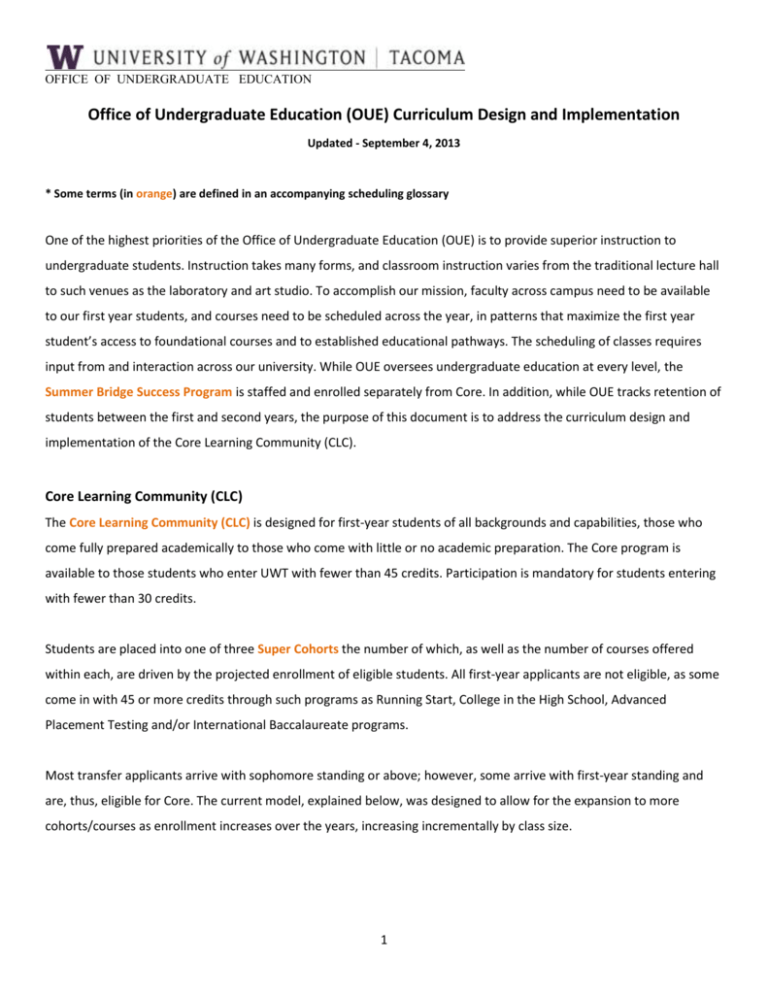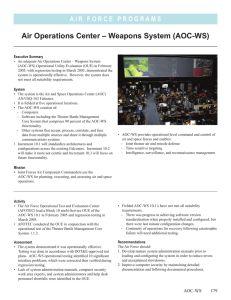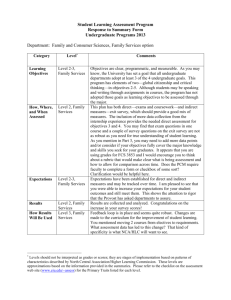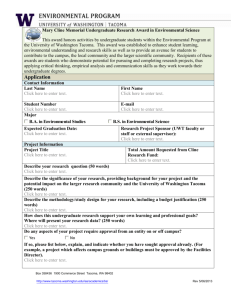OUE Curriculum Design and Implementation
advertisement

OFFICE OF UNDERGRADUATE EDUCATION Office of Undergraduate Education (OUE) Curriculum Design and Implementation Updated - September 4, 2013 * Some terms (in orange) are defined in an accompanying scheduling glossary One of the highest priorities of the Office of Undergraduate Education (OUE) is to provide superior instruction to undergraduate students. Instruction takes many forms, and classroom instruction varies from the traditional lecture hall to such venues as the laboratory and art studio. To accomplish our mission, faculty across campus need to be available to our first year students, and courses need to be scheduled across the year, in patterns that maximize the first year student’s access to foundational courses and to established educational pathways. The scheduling of classes requires input from and interaction across our university. While OUE oversees undergraduate education at every level, the Summer Bridge Success Program is staffed and enrolled separately from Core. In addition, while OUE tracks retention of students between the first and second years, the purpose of this document is to address the curriculum design and implementation of the Core Learning Community (CLC). Core Learning Community (CLC) The Core Learning Community (CLC) is designed for first-year students of all backgrounds and capabilities, those who come fully prepared academically to those who come with little or no academic preparation. The Core program is available to those students who enter UWT with fewer than 45 credits. Participation is mandatory for students entering with fewer than 30 credits. Students are placed into one of three Super Cohorts the number of which, as well as the number of courses offered within each, are driven by the projected enrollment of eligible students. All first-year applicants are not eligible, as some come in with 45 or more credits through such programs as Running Start, College in the High School, Advanced Placement Testing and/or International Baccalaureate programs. Most transfer applicants arrive with sophomore standing or above; however, some arrive with first-year standing and are, thus, eligible for Core. The current model, explained below, was designed to allow for the expansion to more cohorts/courses as enrollment increases over the years, increasing incrementally by class size. 1 OFFICE OF UNDERGRADUATE EDUCATION CORE MODEL Super Cohorts allow students to travel across the first year with 75-125 other first year students. This model provides a hybrid of a learning community and choice, as students choose from 3 – 5 options for each Core course. These cohorts are theme driven to make the choices fit student interest as much as possible. Through a series of faculty development workshops, Core faculty collaborate on a broad theme that is touched on in each course, both as a way to differentiate each cohort and as way to bring meaning to each cohort, connecting courses in a way that encourages transfer of learning and student engagement. Each cohort is sequenced to progress through the four required areas of knowledge in a different order. Staggering the areas of knowledge completion allows students in each cohort to travel through the courses together. This structure also assists in balancing the expertise of each faculty member. For example, students in Cohort 1 may take their VLPA in the Autumn quarter, I&S in the Winter, and NW in the Spring, while students in Cohort 2 may take I&S in the Autumn, NW in the Winter, and VLPA in the Spring, and so on. This configuration is based on the 2013 model. Current practice in scheduling Composition, the 4th area of knowledge, is 20 sections of Composition spread across three quarters: nine sections in Autumn and Winter quarters, and two in Spring Quarter. (See Appendix A for the Core Learning Community grid of courses and distributions for 2013-2014) Cap for classes in Cohorts is at 25, with the exception of Composition, which is set at 20. The pedagogical research for a lower class size for writing overwhelmingly supports this as a standard. Exceptions to Core Enrollment Students who complete Introduction to Academic Writing with a 2.0 or higher who also have a broad distribution of credits may be exempted by the Office of Undergraduate Education (OUE) from participating in the Core Learning Community (CLC). In addition, students entering the CLC with an intention to major in Computer Engineering and Systems, Computer Science and Systems, or Environmental Science may request permission to substitute a NW course required by their intended major for their Core NW course. Adviser permission is required, and the substituted course must be completed prior to or during the quarter in which the student is scheduled to take their Core NW course. All Core exceptions granted by academic advisers should be submitted in writing to the OUE. Approval is required prior to granting such exceptions, and to that end, we use a Catalyst form for submitting and tracking these requests. 2 OFFICE OF UNDERGRADUATE EDUCATION FACULTY ALLOCATION Because OUE does not have its own faculty, we depend on commitments from each unit across campus to provide faculty and support for Core courses. Under current practice, OUE provides the number of courses needed in each Area of Knowledge (AoK) except Composition, to the academic units based on enrollment projections. The unit directors then designate faculty to teach those courses in the CLC. The number of courses needed each year varies with enrollment, but the percentage of courses taught by each unit should remain consistent from year to year in order to maintain equity. Revision of current staffing policy is expected to place in collaboration with the newly formed UEAC. By September 16 of the transition year (2013), units will receive the number of courses needed by AoK for the next academic year and the tentative Core course schedule. In the future, this date will be April 30th. (See IAS Curriculum Scheduling Guidelines) Review of the Schedule The review of the schedule and the coordination of the schedule between the CLC and the other academic units will be done as part of the regular campus scheduling procedures. Core faculty will be identified by Directors/Deans with Curricular Staff by October 25th of the transition year (2013), and by June 13th for all future years. Curricular staff will communicate Core allocations to OUE by October 30th in the transition year and by June 30th in future years. (See IAS Curriculum Scheduling Guidelines) Reconciliation of Discrepancies Any issues or discrepancies in the schedule will be identified in the Campus Scheduling Conversation (CSC) in August, with the exception of the transition year (i.e., academic year 2013-14) when the CSC will occur in November. EXPECTATIONS FOR CORE FACULTY Faculty across campus who teach in the CLC are expected to provide first-year students with foundational knowledge on which they can build their academic careers. This involves more than a delivery of knowledge. It also involves designing curriculum that is challenging, creative, and engaging on many levels by using active scaffolding pedagogical techniques. Faculty should expect to deliver foundational skills such as library usage and time management. Faculty should also be flexible with their class time: much of the campus has an interest in reaching out to these first-year students, particularly in Autumn quarter. Core faculty are thus encouraged to welcome guest speakers from the various support units on our 3 OFFICE OF UNDERGRADUATE EDUCATION campus into their classrooms for brief announcements and delivery of information pertinent to first year students who are finding their way in college. Master Calendar of Classroom visits: All visits to Core classes will be scheduled on a master calendar of the academic year. One month prior to autumn quarter, Core faculty will be given a schedule of these visits for the entire year. Visits to Core classes that have not been previously arranged will not be allowed. Faculty Development for Core: OUE provides faculty development workshops throughout the year, beginning early in September. These workshops are designed to help faculty identify best teaching strategies, create engaging curriculum for first year students, as well as Student Learning Objectives that are in line with University-wide SLOs and syllabi that facilitate the learning process in the first year. We also provide a variety of pedagogical resources in this effort. (See Professional Development and Pedagogy Workshops below.) Peer Observation, Review and Assessment: All faculty who are new to teaching in the Core Learning Community receive peer observations from the Director, Assistant Director or Core Coordinator. These letters are kept on file in OUE, and if the faculty member desires, may be sent to their home academic unit for their files. Teaching Evaluations: All Core faculty are expected to have their courses formally evaluated, using approved University of Washington Tacoma forms. OUE provides these forms for each faculty member. Assessment of evaluations: Evaluations are used, in concert with peer observations, to assess the effectiveness of the faculty member’s teaching in the Core program. Professional Development and Pedagogy Workshops: OUE will provide regular workshops on such topics such as Classroom Management, Designing a First Year Course, Creating an Effective Syllabus to address any issues throughout the year that Core faculty may encounter. Mid-Quarter Assessments, by appointment: OUE will encourage all Core faculty members to use Mid-Quarter Assessments in their courses. These assessments will be provided by our office, and have been shown to be very effective for any necessary mid-course corrections. UNDERGRADUATE EDUCATION ACADEMIC COUNCIL (UEAC) New to OUE this year, The Undergraduate Education Academic Council (UEAC) will be overseeing the curriculum and the development of student learning outcomes specific to first year students and their academic needs. The Executive Council of Faculty Assembly passed Class B legislation Spring quarter 2013 that mandates formal faculty oversight of 4 OFFICE OF UNDERGRADUATE EDUCATION academic units on campus that do not have permanent faculty lines. OUE is forming a council that will help meet this mandate. This council will have wide representation across academic units on campus, and will meet quarterly to discuss curriculum issues pertaining to undergraduate education at UWT. We anticipate that this council will play an important role in elevating the profile and quality of the undergraduate academic experience on campus. The role of the council will be to oversee curriculum in the core, as well as the student learning objectives for core students. 5










